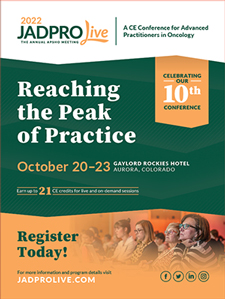Back


Clinical Posters
JL1017C: Importance of Germline Testing in Colorectal Cancer Patients
Saturday, October 22, 2022
10:00 AM – 11:00 AM ET

Has Audio

Carol Guarnieri, MSN, FNP-C,
Oncology Nurse Practitioner
HonorHealth Research Institute
Scottsdale, Arizona, United States
Poster Presenter(s)
BACKGROUND
Most commonly, colorectal cancer (CRC) occurs sporadically. However, well acknowledged familiar cancer syndromes are also identified. Genetic susceptibility to CRC includes Lynch Syndrome, familiar adenomatous polyposis, MUTHY associated polyposis, and others. There are individuals that do not meet certain criteria, by lack of family history, polyposis, or age for genetic testing. These individuals are considered at average risk for developing CRC. Due to lack of national guidelines, identification of genetic testing in average risk individuals who have a diagnosis of colorectal cancer is not the standard of care. Identification of a germline pathogenic variant in already diagnosed cancer patients is usually not done. By identifying a germline pathogenic variant, it can lead to potential novel treatment options for patients, along with cascade testing of at risk family members. Cascade testing can lead to early identification of a mutation in a family member which is essential for cancer prevention and early detection.
METHOD
At Honor Health Research Institute, our main goal is to offer phase one clinical trial opportunities for patients. Most patients with CRC are referred to us to discuss clinical trial options. Regardless of patient's age or family history, all patients undergo germline testing. Germline testing was completed by using testing panel that consist of 64-91 genes.
RESULTS
A total of 150 patients with a diagnosis of CRC underwent germline testing. Forty patients were under the age of 50 years old. Despite lack of family history, pathogenic variants were identified in 14 patients. The most common mutations were MUTHY and CHEK2. Of interest, only 1 pathogenic mutation was identified in a patient under 50 years old. A variant of unknown significance (VUS) was seen in 66 patients. Seventy patient had negative results. All patients with a pathogenic mutation underwent genetic counseling with appropriate testing of family members. Cascade testing of family members within 90 days of a patient's test report was completed free of charge this cascade testing resulted in identification of mutations within family members. Patients with a VUS or negative test results were informed of the findings and provided a written copy of the report.
CONCLUSION/RECOMMENDATIONS
We recommend that all patients with a diagnosis of CRC, regardless of age and family history, undergo germline testing. An understanding of a patient's germline genetics can be beneficial to identify new treatment options. With the rapid changing landscape of genetics, it is of utmost importance that national guidelines be established. Our patient's data is housed in a national database. A reclassification of a patient's VUS is possible. With cascade testing to identify family members that are high risk for developing cancer, screening methods can be tailored to their mutation.
Most commonly, colorectal cancer (CRC) occurs sporadically. However, well acknowledged familiar cancer syndromes are also identified. Genetic susceptibility to CRC includes Lynch Syndrome, familiar adenomatous polyposis, MUTHY associated polyposis, and others. There are individuals that do not meet certain criteria, by lack of family history, polyposis, or age for genetic testing. These individuals are considered at average risk for developing CRC. Due to lack of national guidelines, identification of genetic testing in average risk individuals who have a diagnosis of colorectal cancer is not the standard of care. Identification of a germline pathogenic variant in already diagnosed cancer patients is usually not done. By identifying a germline pathogenic variant, it can lead to potential novel treatment options for patients, along with cascade testing of at risk family members. Cascade testing can lead to early identification of a mutation in a family member which is essential for cancer prevention and early detection.
METHOD
At Honor Health Research Institute, our main goal is to offer phase one clinical trial opportunities for patients. Most patients with CRC are referred to us to discuss clinical trial options. Regardless of patient's age or family history, all patients undergo germline testing. Germline testing was completed by using testing panel that consist of 64-91 genes.
RESULTS
A total of 150 patients with a diagnosis of CRC underwent germline testing. Forty patients were under the age of 50 years old. Despite lack of family history, pathogenic variants were identified in 14 patients. The most common mutations were MUTHY and CHEK2. Of interest, only 1 pathogenic mutation was identified in a patient under 50 years old. A variant of unknown significance (VUS) was seen in 66 patients. Seventy patient had negative results. All patients with a pathogenic mutation underwent genetic counseling with appropriate testing of family members. Cascade testing of family members within 90 days of a patient's test report was completed free of charge this cascade testing resulted in identification of mutations within family members. Patients with a VUS or negative test results were informed of the findings and provided a written copy of the report.
CONCLUSION/RECOMMENDATIONS
We recommend that all patients with a diagnosis of CRC, regardless of age and family history, undergo germline testing. An understanding of a patient's germline genetics can be beneficial to identify new treatment options. With the rapid changing landscape of genetics, it is of utmost importance that national guidelines be established. Our patient's data is housed in a national database. A reclassification of a patient's VUS is possible. With cascade testing to identify family members that are high risk for developing cancer, screening methods can be tailored to their mutation.

